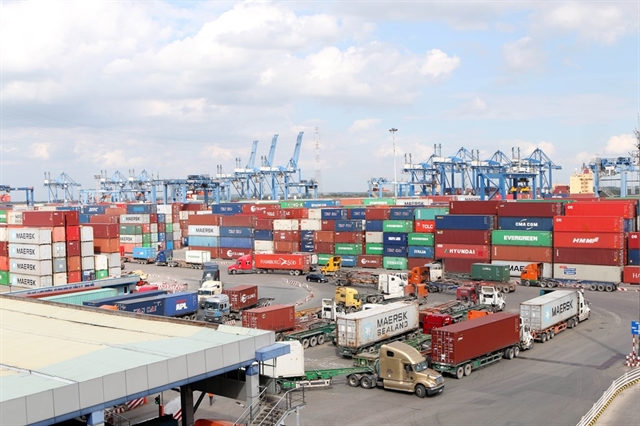
HÀ NỘI — The seaport industry is expected to continue to grow strongly this year thanks to active import and export activities and the fact that Việt Nam remains an attractive destination for FDI inflows. Higher handling fees will also benefit seaport enterprises.
Positive outlook
ACB Securities Ltd. (ACBS) said that in 2022 it was expected that transportation activities will remain stable, with the volume of goods up about 6 per cent.
The volume of goods transported through Vietnamese seaports in 2022 is forecast to reach 750 million tonnes, up about 3 per cent compared to last year, the securities firm added.
The industry's growth is driven by the recovery and reopening of the global economy thanks to the higher COVID-19 vaccination rate, helping trading activities.
Việt Nam is still an attractive destination for FDI inflows due to the disruption of the global supply chains and the wave of a production shift. The country also benefits from many free trade agreements.
FDI inflows into Việt Nam recorded a compound growth rate of over 8 per cent in 2014-2020, boosting the volume of goods transported through seaports. In 2021, FDI capital is estimated at US$31.15 billion, up 9.2 per cent over 2020.
In addition, the Ministry of Transport is submitting to the Government a draft amendment to a circular on handling fees at Vietnamese seaports. Handling fees at ports will increase by 10 per cent in 2022-2024 depending on the port area, resulting in higher profits for seaport enterprises.
However, ACBS also pointed out challenges the industry is likely to face in 2022, including higher freight rates, which increase short-term risks.
Due to the scarcity of containers and congestion at major ports in the world, freight rates have surged, which reduces the number of goods circulating through seaports. Rising oil prices also push transportation costs higher, reducing shipping demand.
The continuing complexity of the COVID-19 pandemic still badly affects global supply chains, causing lower consumer demand and negatively impacting the workforce in the industry.
Big returns
Despite the developments of COVID-19, Vietnamese seaport enterprises still witnessed outstanding growth in profits last year.
The fourth quarter business result of Việt Nam National Shipping Lines (VIMC) showed that its profit after tax reached VNĐ2.9 trillion in 2021, 14 times higher than that of 2020.
Its shipping volume was 23 million tonnes, reaching 121 per cent of the plan. After many years of losses, VIMC's shipping sector posted a positive performance in 2021.
Sixteen VIMC seaports have handled over 125 million tonnes of goods, up 13 per cent compared to 2020.
VIMC's port system has also developed 13 new routes for container shipping lines. The sector continues to be the most effective business activity of the company, accounting for 78 per cent of total consolidated profit.
Port of Hải Phòng also posted net revenue of VNĐ2.2 trillion in 2021, up 12.5 per cent year-on-year, with profit after tax reaching nearly VNĐ694.6 billion, up more than 23 per cent.
Similarly, Saigon Port's net revenue climbed by 46.6 per cent year-on-year to VNĐ1.37 trillion last year, while its profit after tax attained VNĐ893.4 billion, nearly four times higher than in 2020.
In the last quarter financial statement of 2021, VIP Greenport saw a gain of nearly 10 per cent over 2020 to VNĐ816.1 billion in net revenue, resulting in a profit after tax of VNĐ203.7 billion, up 34.2 per cent.
VIP Greenport operates in cargo handling, seaport services, warehousing and coastal freight transport services.
Analysts from SSI Securities Corporation said that on the stock market, the seaport and logistics stock value grew up to 94 per cent in 2021, 60 per cent higher than the market benchmark VN-Index. Of which, MVN surged by 205 per cent, SGP up 183 per cent, PHP jumped 72 per cent and VGR up 30.7 per cent. — VNS
Xem thêm: lmth.2202-ni-raey-gnisimorp-rof-tes-sesirpretne-tropaes/8233511/ymonoce/nv.swenmanteiv